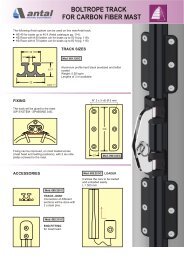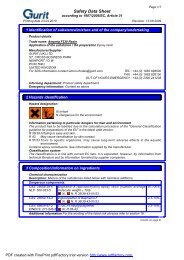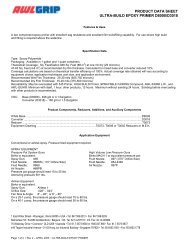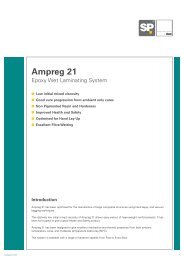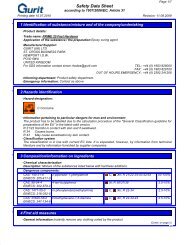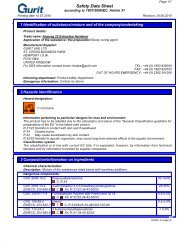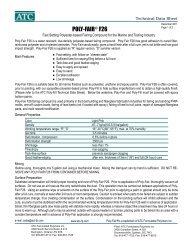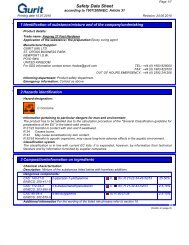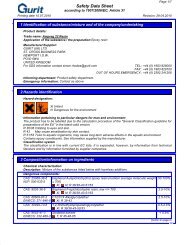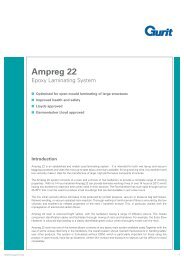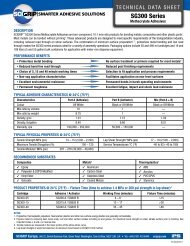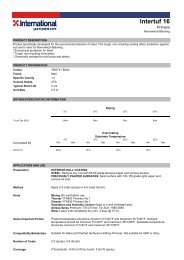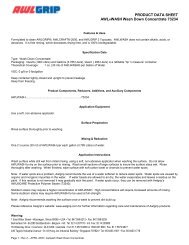Ampreg 22 Fast Hardener - Marineware
Ampreg 22 Fast Hardener - Marineware
Ampreg 22 Fast Hardener - Marineware
- No tags were found...
You also want an ePaper? Increase the reach of your titles
YUMPU automatically turns print PDFs into web optimized ePapers that Google loves.
DRSafety Data Sheetaccording to 1907/2006/EC, Article 31Page 1/7Printing date 15.07.2010 Revision: 17.06.2010* 1 Identification of substance/mixture and of the company/undertaking· Product details:· Trade name: <strong>Ampreg</strong> <strong>22</strong> <strong>Fast</strong> <strong>Hardener</strong>· Application of the substance / the preparation Epoxy curing agent· Manufacturer/Supplier:GURIT (UK) LTDST. CROSS BUSINESS PARKNEWPORT I.O.W.PO30 5WUUNITED KINGDOMFor SDS information contact simon.rhodes@gurit.com TEL.: +44 (0) 1983 828000FAX : +44 (0) 1983 828100OUT OF HOURS EMERGENCY.: +44 (0) 2392 241208· Informing department: Product safety department.· Emergency information: Contact as above* 2 Hazards identification· Hazard designation:C Corrosive· Information pertaining to particular dangers for man and environmentThe product has to be labelled due to the calculation procedure of the "General Classification guideline forpreparations of the EU" in the latest valid version.R 20/21/<strong>22</strong> Harmful by inhalation, in contact with skin and if swallowed.R 34 Causes burns.R 43 May cause sensitisation by skin contact.R 68 Possible risk of irreversible effects.R 52/53 Harmful to aquatic organisms, may cause long-term adverse effects in the aquatic environment.· Classification systemThe classification is in line with current EC lists. It is expanded, however, by information from technicalliterature and by information furnished by supplier companies.* 3 Composition/information on ingredients· Chemical characterization· Description: Mixture of the substances listed below with harmless additions.· Dangerous components:CAS: 32610-77-8 Formaldehyde Polymer with Phenol and TETAC, Xn; R 21/<strong>22</strong>-34-43-52/53CAS: 140-31-8 2-piperazin-1-ylethylamineEINECS: 205-411-0 C, Xn; R 21/<strong>22</strong>-34-43-52/53CAS: 100-51-6 Benzyl alcoholEINECS: 202-859-9 Xn, Xi; R 20/<strong>22</strong>-43CAS: 108-95-2 phenolEINECS: 203-632-7 T, C; R 23/24/25-34-48/20/21/<strong>22</strong>-68CAS: 112-24-3EINECS: 203-950-63,6-diazaoctanethylenediaminC, Xn; R 21-34-43-52/5325-50%25-50%10-25%2.5-10%2.5-10%(Contd. on page 2)GB
DRSafety Data Sheetaccording to 1907/2006/EC, Article 31Page 2/7Printing date 15.07.2010 Revision: 17.06.2010Trade name: <strong>Ampreg</strong> <strong>22</strong> <strong>Fast</strong> <strong>Hardener</strong>CAS: 929-59-9 3,6-dioxaoctamethylenediamineEINECS: 213-203-6 C, Xn; R <strong>22</strong>-34-43CAS: 2855-13-2 3-aminomethyl-3,5,5-trimethylcyclohexylamineEINECS: <strong>22</strong>0-666-8 C, Xn; R 21/<strong>22</strong>-34-43-52/53CAS: 9046-10-0 PolyoxyalkyleneamineC; R 34CAS: 98-54-4 4-tert-butylphenolEINECS: 202-679-0 Xi; R 36/37/38(Contd. of page 1)2.5-10%2.5-10%2.5-10%0.5-2.5%* 4 First aid measures· General informationInstantly remove any clothing soiled by the product.Symptoms of poisoning may even occur after several hours; therefore medical observation for at least 48hours after the accident.· After inhalationSupply fresh air and call for doctor for safety reasons.In case of unconsciousness bring patient into stable side position for transport.· After skin contact Instantly wash with water and soap and rinse thoroughly.· After eye contact Rinse opened eye for several minutes under running water. Then consult doctor.· After swallowingDo not induce vomiting; instantly call for medical help.A person vomiting while lying on their back should be turned onto their side.Administer medicinal carbonRinse out mouth and then drink plenty of water.* 5 Fire fighting measures· Suitable extinguishing agentsWater hazeFoamFire-extinguishing powderCarbon dioxide· For safety reasons unsuitable extinguishing agents Water with a full water jet.· Special hazards caused by the material, its products of combustion or resulting gases:Formation of toxic gases is possible during heating or in case of fire.· Protective equipment:Put on breathing apparatus.Wear full protective suit.· Additional information Collect contaminated fire fighting water separately. It must not enter drains.* 6 Accidental release measures· Person-related safety precautions: Wear protective equipment. Keep unprotected persons away.· Measures for environmental protection: Do not allow to enter drainage system, surface or ground water.· Measures for cleaning/collecting:Absorb with liquid-binding material (sand, diatomite, acid binders, universal binders, sawdust).Dispose of contaminated material as waste according to item 13.(Contd. on page 3)GB
DRSafety Data Sheetaccording to 1907/2006/EC, Article 31Page 3/7Printing date 15.07.2010 Revision: 17.06.2010Trade name: <strong>Ampreg</strong> <strong>22</strong> <strong>Fast</strong> <strong>Hardener</strong>Ensure adequate ventilation.(Contd. of page 2)* 7 Handling and storage· Handling· Information for safe handling: Ensure good ventilation/exhaustion at the workplace.· Information about protection against explosions and fires: No special measures required.· Storage· Requirements to be met by storerooms and containers: No special requirements.· Information about storage in one common storage facility: Not required.· Further information about storage conditions: Keep container tightly sealed.* 8 Exposure controls and personal protection· Additional information about design of technical systems: No further data; see item 7.· Components with limit values that require monitoring at the workplace:108-95-2 phenol (2.5-10%)OEL Short-term value: 38 mg/m3, 10 ml/m3Long-term value: 19 mg/m3, 5 ml/m3· Additional information: The lists that were valid during the compilation were used as basis.· Personal protective equipment· General protective and hygienic measuresKeep away from foodstuffs, beverages and food.Take off immediately all contaminated clothingWash hands during breaks and at the end of the work.Avoid contact with the eyes and skin.· Breathing equipment: Use breathing protection in case of insufficient ventilation.· Protection of hands:Protective gloves.· Material of glovesThe selection of the suitable gloves does not only depend on the material, but also on further marks of qualityand varies from manufacturer to manufacturer. As the product is a preparation of several substances, theresistance of the glove material can not be calculated in advance and has therefore to be checked prior tothe application.· Penetration time of glove materialThe exact break trough time has to be found out by the manufacturer of the protective gloves and has to beobserved.· For the permanent contact of a maximum of 15 minutes gloves made of the following materials aresuitable:Nitrile rubber, NBR· As protection from splashes gloves made of the following materials are suitable: Nitrile rubber, NBR· Eye protection:Tightly sealed safety glasses.(Contd. on page 4)GB
DRSafety Data Sheetaccording to 1907/2006/EC, Article 31Page 4/7Printing date 15.07.2010 Revision: 17.06.2010Trade name: <strong>Ampreg</strong> <strong>22</strong> <strong>Fast</strong> <strong>Hardener</strong>· Body protection: Protective work clothing.(Contd. of page 3)* 9 Physical and chemical properties:· General InformationForm:Colour:Odour:FluidLight brownAmine-like· Change in conditionMelting point/Melting range: Not determinedBoiling point/Boiling range: 88°C· Flash point: 118°C (Pensky Martin closed cup)· Ignition temperature: 315.0°C· Self-inflammability: Product is not selfigniting.· Danger of explosion: Product is not explosive.· Density at 20°C 1.000 g/cm3· Solubility in / Miscibility withWater:· pH-value at 20°C: 11.0· Viscosity:dynamic at 20°C:Not miscible or difficult to mix180 mPas· Solvent content:Organic solvents: 0.0 %Water: 0.0 %* 10 Stability and reactivity· Thermal decomposition / conditions to be avoided: No decomposition if used according to specifications.· Materials to be avoided:· Dangerous reactions No dangerous reactions known· Dangerous products of decomposition: Danger of toxic pyrolysis products11 Toxicological information· Acute toxicity:· LD/LC50 values that are relevant for classification:140-31-8 2-piperazin-1-ylethylamineOral LD50 1470 mg/kg (rat)Dermal LD50 866 mg/kg (rbt)108-95-2 phenolOral LD50 300 mg/kg (mus)Dermal LD50 670 mg/kg (rat)Inhalative LC50/4 h 316 mg/l (rat)(Contd. on page 5)GB
DRSafety Data Sheetaccording to 1907/2006/EC, Article 31Page 5/7Printing date 15.07.2010 Revision: 17.06.2010Trade name: <strong>Ampreg</strong> <strong>22</strong> <strong>Fast</strong> <strong>Hardener</strong>(Contd. of page 4)· Primary irritant effect:· on the skin: Caustic effect on skin and mucous membranes.· on the eye: Strong caustic effect.· Sensitization: Sensitization possible by skin contact.· Additional toxicological information:The product shows the following dangers according to the calculation method of the General ECClassification Guidelines for Preparations as issued in the latest version:HarmfulCorrosiveIrritantSwallowing will lead to a strong caustic effect on mouth and throat and to the danger of perforation ofesophagus and stomach.· Sensitisation May cause sensitisation by skin contact.* 12 Ecological information:· Additional ecological information:· General notes:Water hazard class 1 (German Regulation) (Self-assessment): slightly hazardous for water.Do not allow product to reach ground water, water bodies or sewage system.* 13 Disposal considerations· Product:· RecommendationMust not be disposed of together with household garbage. Do not allow product to reach sewage system.· European waste catalogue08 00 00 WASTES FROM THE MANUFACTURE, FORMULATION, SUPPLY AND USE (MFSU) OFCOATINGS (PAINTS, VARNISHES AND VITREOUS ENAMELS), ADHESIVES, SEALANTSAND PRINTING INKS08 04 00 wastes from MFSU of adhesives and sealants (including waterproofing products)08 04 09 waste adhesives and sealants containing organic solvents or other dangerous substances· Uncleaned packagings:· Recommendation:Packagings that cannot be cleaned are to be disposed of in the same manner as the product.* 14 Transport information· Land transport ADR/RID (cross-border)· ADR/RID Class: 8 Corrosive substances.· Kemler Number: 80· UN-Number: 2735· Packaging group: III(Contd. on page 6)GB
DRSafety Data Sheetaccording to 1907/2006/EC, Article 31Page 6/7Printing date 15.07.2010 Revision: 17.06.2010Trade name: <strong>Ampreg</strong> <strong>22</strong> <strong>Fast</strong> <strong>Hardener</strong>(Contd. of page 5)· Label 8· Designation of goods: 2 7 3 5 P O L Y A M I N E S , L I Q U I D , C O R R O S I V E , N . O . S .(TRIETHYLENETETRAMINE, N-AMINOETHYLPIPERAZINE)· Maritime transport IMDG:· IMDG Class: 8· UN Number: 2735· Label 8· Packaging group: III· EMS Number: F-A,S-B· Marine pollutant: No· Segregation groups Alkalis· Correct technical name: POLYAMINES, LIQUID, CORROSIVE, N.O.S. (TRIETHYLENETETRAMINE, N-AMINOETHYLPIPERAZINE)· Air transport ICAO-TI and IATA-DGR:· ICAO/IATA Class: 8· UN/ID Number: 2735· Label 8· Packaging group: III· Correct technical name: POLYAMINES, LIQUID, CORROSIVE, N.O.S. (TRIETHYLENETETRAMINE, N-AMINOETHYLPIPERAZINE)* 15 Regulatory information· Designation according to EC guidelines:The product has been classified and labelled in accordance with EC Directives / Ordinance on HazardousMaterials (GefStoffV)· Code letter and hazard designation of product:C Corrosive· Hazard-determining components of labelling:2-piperazin-1-ylethylaminephenolBenzyl alcohol3,6-diazaoctanethylenediamin3,6-dioxaoctamethylenediamine3-aminomethyl-3,5,5-trimethylcyclohexylamine· Risk phrases:20/21/<strong>22</strong> Harmful by inhalation, in contact with skin and if swallowed.34 Causes burns.43 May cause sensitisation by skin contact.68 Possible risk of irreversible effects.(Contd. on page 7)GB
DRSafety Data Sheetaccording to 1907/2006/EC, Article 31Page 7/7Printing date 15.07.2010 Revision: 17.06.2010Trade name: <strong>Ampreg</strong> <strong>22</strong> <strong>Fast</strong> <strong>Hardener</strong>(Contd. of page 6)52/53 Harmful to aquatic organisms, may cause long-term adverse effects in the aquatic environment.· Safety phrases:9 Keep container in a well-ventilated place.20 When using do not eat or drink.23 Do not breathe fumes.26 In case of contact with eyes, rinse immediately with plenty of water and seek medical advice.36/37/39 Wear suitable protective clothing, gloves and eye/face protection.45 In case of accident or if you feel unwell, seek medical advice immediately (show the label wherepossible).· National regulations· Technical instructions (air):Class Share in %I 4.5II 11.1III 26.3· Water hazard class: Water hazard class 1 (Self-assessment): slightly hazardous for water.* 16 Other information:These data are based on our present knowledge. However, they shall not constitute a guarantee for anyspecific product features and shall not establish a legally valid contractual relationship.· Relevant R-phrases20/<strong>22</strong> Harmful by inhalation and if swallowed.21 Harmful in contact with skin.21/<strong>22</strong> Harmful in contact with skin and if swallowed.<strong>22</strong> Harmful if swallowed.23/24/25 Toxic by inhalation, in contact with skin and if swallowed.34 Causes burns.36/37/38 Irritating to eyes, respiratory system and skin.43 May cause sensitisation by skin contact.48/20/21/<strong>22</strong> Harmful: danger of serious damage to health by prolonged exposure through inhalation, incontact with skin and if swallowed.52/53 Harmful to aquatic organisms, may cause long-term adverse effects in the aquatic environment.68 Possible risk of irreversible effects.· Department issuing data specification sheet: Health, Safety & Environmental department.· Contact: SIMON RHODES· * Data compared to the previous version altered.GB



